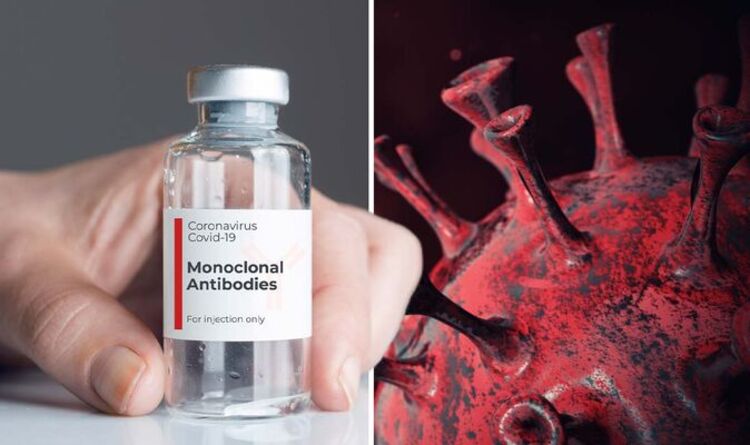Omicron sub-variant discussed by infectious disease expert
We use your sign-up to provide content in ways you’ve consented to and to improve our understanding of you. This may include adverts from us and 3rd parties based on our understanding. You can unsubscribe at any time. More info
Experts, including the UK Health Security Agency (UKHSA), have warned that certain vaccines are “less effective” against Omicron. However, the hope in the form of a booster shot was established as a possible solution to the Omicron outbreak. A new study now brings more evidence.
Research published in the journal Nature has found that Covid vaccines and monoclonal antibody treatments offer “less protection” against the new Omicron subvariants.
In case you’re not aware, monoclonal antibody treatments are used to engage your “body’s germ-fighting immune system against diseases”, the Mayo Clinic explains.
Some of these treatments, such as sotrovimab, were believed to cut your risk of Covid death by 79 percent.
Apart from the bad news, the study also shares that there’s one authorised treatment that still seems effective against all Omicron subvariants.

The research looked at 19 monoclonal antibodies in total.
During their experiments, the three subvariants of Omicron named BA.1, BA.1.1 and BA.2 showed “strong resistance” to most of these.
What’s worse, 17 of these antibodies proved “ineffective” against the BA.2 subvariant.
The same worry was first raised by the researchers at the University of Tokyo in Japan who found that Omicron BA.2 may be able to fend off certain treatments.
Fortunately, this new research found that bebtelovimab is “the only currently available antibody therapy that can adequately treat all three Omicron subvariants”.
Bebtelovimab is also the latest monoclonal antibody to receive FDA Emergency Use Authorisation.
The therapy was approved to treat non-hospitalised patients who suffer from mild to moderate Covid and are at risk of progressing to severe disease.
They explain that the monoclonal antibody binds to the spike protein of coronavirus.

David D. Ho, director of the Aaron Diamond AIDS Research Center, said: “The emergence of new variants is narrowing our treatment options and challenging the effectiveness of our current vaccines.
“It is critical that we don’t relax prematurely and continue to devise novel strategies to contain this ever-evolving pathogen.”
When it comes to vaccines, the study shows that the effectiveness of mRNA vaccines, in particular, is lowered against all three Omicron subvariants.
Similarly to UKHSA’s findings, the decline in neutralisation was “less prominent” in those who had their three jabs.

What are the symptoms of Omicron BA.2?
There’s no set list of symptoms associated directly with this Omicron strain.
However, some experts voiced that BA.2 will likely present similar signs to the original Omicron.
Based on the doctors’ and patients’ reports, Omicron symptoms include:
- Scratchy throat
- Mild muscle aches
- Extreme tiredness
- Dry cough
- Night sweats
- Runny nose
- Headache
- Loss of appetite
- Diarrhoea.
Source: Read Full Article
